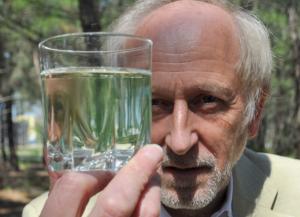A passion for tritium
Like his grandfather, a coal miner in Poland's Silesia region who emigrated to Germany in the early 1920s, Manfred Glugla, ITER Fuel Cycle Engineering Division Head, works to supply energy to mankind.
The family settled near Dortmund in the Westphalian basin where Manfred grew up. At age 14, he entered professional life as an apprentice in a chemical lab.
The young lad was already curious about everything, from the inner workings of objects to the physics and math involved in his day-to-day work. "There were graduate students in that lab also, and they kept telling me: 'Go to evening school, it's not too late! This can't be the end of your education!' And that's exactly what I did ..."
Thanks to evening school the young apprentice earned his undergraduate degree, went on to receive a diploma in chemical engineering at an "Applied Science University," wrote a thesis in physical chemistry on tritium diffusion, and eventually, in 1984, obtained his PhD summa cum laude. "I wanted to know and understand everything," says Manfred today. "When only three courses out of eight were required, I managed to take them all—electronics, group theory, radiochemistry, you name it ... I was just crazy about learning."
Manfred married at 21 and kept studying for the following 12 years. "My wife supported me all that time ... I owe her a lot," he says. He owes a lot, also, to his family background and to his early work experience. "My values have remained those I was brought up with. I fix things that most people just throw away ... I'm still using the HP scientific calculator that I bought in 1974 and I still drive my old 1984 Land Cruiser to commute between Aix and ITER."
Starting off as an apprentice provided Manfred with a strong sense of "feasibility and manufacturability." "I have a gut feeling," he says, "for what is doable and what is not." In science projects like ITER there is always something that deviates from theory and that's where the apprentice has something important to share with the physicists.
Manfred joined the European fusion program in Karlsruhe in 1984 and worked for ITER "from day one." His PhD was in surface science and metal physics but the position he was offered was in the Tritium Lab that was being constructed at the time. Eventually, Manfred rose to head the facility.
Tritium has been at the core of his professional life and interests ever since. Manfred can talk about tritium as a horticulturist would talk about a rare orchid, praising its unique properties, marvelling at its "gyro-magnetic ratio" and pondering its particular relationship with hydrogen—"the same and yet so different ..."
"Tritium," says the ITER Fuel Cycle Engineering Division Head, "is a gift of Mother Nature ..."


